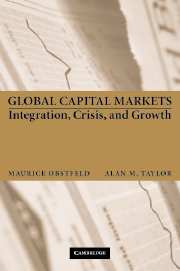Book contents
7 - Uneven Integration
Published online by Cambridge University Press: 03 February 2010
Summary
The principal goal of earlier chapters was to document the ebb and flow of aggregate capital flows in the world economy over the long run. But these fluctuations have hardly been uniform in character, whether in the types of capital or in the types of countries involved. This unevenness is useful for deeper empirical analysis because it may help to throw statistical light on the factors that have driven the broader dynamics of global financial integration.
Throughout this book we have concentrated on aggregate data and on the global view. One drawback of the global view is that it can mask important differences between countries. If today one listened only to news reports, one might be forgiven for thinking that financial globalization, as well as being a powerful force, is also ubiquitous.
Yet this is far from true in reality. Indeed, the unevenness of different country groups' integration into the global economy is, potentially, a cause for concern. The new financial globalization is for the most part confined to rich countries. A handful of developing countries (“emerging markets”) also participate to some degree, but most other developing countries are left out, and to the extent that they receive foreign funds at all, they rely on occasional public debt offerings and official development assistance. If capital market participation includes some countries but not others, then a key question is: why, and with what effects? Exclusion may be the result of market failure, or it could be accounted for by institutions and policies. Inclusion may bring benefits, as well as costs, and the tradeoff can tell us whether policies to promote further integration are advisable, and for whom.
- Type
- Chapter
- Information
- Global Capital MarketsIntegration, Crisis, and Growth, pp. 230 - 258Publisher: Cambridge University PressPrint publication year: 2004



